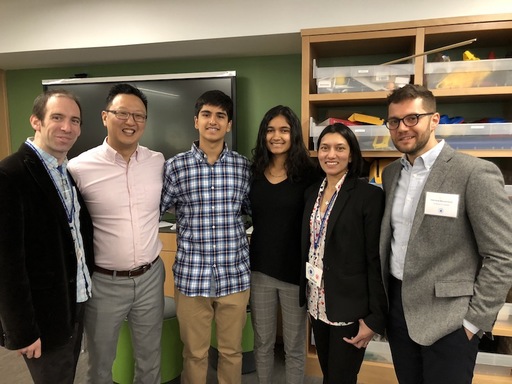Pioneers in Science Lecture Series: Artificial Intelligence and Digital Security

Courtesy of PDS
April 10, 2019
Have you ever wondered about the security of your Amazon Alexa? Have you noticed how almost every advertisement you see online is tailored to your interests, or how some ads are so subtle that they seem like regular content?
Professor Nick Feamster and Dr. Marshini Chetty of Princeton University’s Department of Computer Science dove into these questions and more for this year’s Pioneer in Science Lecture Series. The pair, who are parents of a PDS student, gave the Upper School an engaging talk about machine learning and digital security in our modern age.
In addition to being a professor of Computer Science, Professor Feamster is the Deputy Director of the Princeton University Center for Information Technology Policy. His primary research focus is computer networks, with an emphasis on network security. Dr. Chetty’s area of expertise is in Human-Computer Interaction. Her research goal is to create an efficient, affordable, and secure Internet for all, and she has done impressive work in this field.
The program began in the McAneny Theater with introductions from Upper School Science Chair Jason Park and sophomores Aaliyah Sayed and Om Suchak, two students who are fascinated by computer science and artificial intelligence (AI).
Professor Feamster and Dr. Chetty kicked off their presentation on internet security by speaking about the incredible wave of smart home devices. Feamster spoke about the Princeton IoT (Internet of Things) inspector, a desktop application that allows users to analyze their smart home device and detect potential security problems. He showed the Upper School how machine learning algorithms can detect internet attacks before they even happen, one of the numerous ways in which AI is making the internet safer. Dr. Chetty followed Feamster’s speech by elaborating on another valuable application of machine learning in internet security— combating secret affiliate marketing. She showed us how common it is for YouTube and Pinterest influencers to get away with undisclosed ads. Chetty described a study her team conducted, in which machines analyzed YouTube videos and Pinterest pins. They identified 400 thousand videos and 1.8 million pins that were potential undisclosed advertisements. “There’s a huge opportunity to use AI and machine learning to impact society in positive ways besides getting people to click on ads,” stated Professor Feamster.
Afterward, Dr. Chetty and Professor Feamster held a Q&A in the Wellemeyer STEAM Center for Upper School computer science and engineering students who wanted to learn more about AI and digital security. Students and teachers asked questions ranging from media coverage of data privacy to applications of AI in the future, including in criminal justice and law.
One topic of interest was the most promising areas of AI and machine learning in the future. Dr. Chetty noted, ”One hot area now is deep learning. It’s quite interesting because in certain areas – vision, speech, and translation, for example – it’s working really well.” Students learned that it is never too late to start learning about code and machine learning, and Dr. Chetty and Professor Feamster described their own journeys to successful careers in digital security.
Per usual, this year’s Pioneers in Science speakers had inspiring stories to share. Professor Feamster and Dr. Chetty’s visit sparked interest in artificial intelligence and machine learning as students began to learn more about digital privacy on the web. To conclude their visit, Dr. Chetty and Professor Feamster called on today’s students to join this revolutionary branch of computer science and make important contributions to our digital future.







